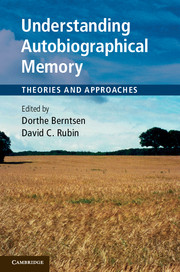Book contents
- Frontmatter
- Contents
- List of figures
- List of tables
- List of contributors
- Preface
- Acknowledgements
- 1 Introduction
- Part I Approaches to the study of autobiographical memory
- 2 The basic systems model of autobiographical memory
- 3 Identity, emotion, and the social matrix of autobiographical memory: a psychoanalytic narrative view
- 4 On the nature of autobiographical memory
- 5 Reflections on autobiographical memory
- Part II Neural studies of autobiographical memory
- Part III Social and cultural aspects of autobiographical memory
- Part IV Development of autobiographical memory from infancy to old age
- Part V Evolution and basic processes of autobiographical memory
- Part VI Discussion
- Index
- References
4 - On the nature of autobiographical memory
Published online by Cambridge University Press: 05 November 2012
- Frontmatter
- Contents
- List of figures
- List of tables
- List of contributors
- Preface
- Acknowledgements
- 1 Introduction
- Part I Approaches to the study of autobiographical memory
- 2 The basic systems model of autobiographical memory
- 3 Identity, emotion, and the social matrix of autobiographical memory: a psychoanalytic narrative view
- 4 On the nature of autobiographical memory
- 5 Reflections on autobiographical memory
- Part II Neural studies of autobiographical memory
- Part III Social and cultural aspects of autobiographical memory
- Part IV Development of autobiographical memory from infancy to old age
- Part V Evolution and basic processes of autobiographical memory
- Part VI Discussion
- Index
- References
Summary
The nature of an individual, of a self, is defined by autobiographical memories unique to that person. Memories, however, may also be shared across individuals who have experienced the same or similar events. Moreover, personal knowledge abstracted from experience, autobiographical knowledge, may be unique to an individual or may generalize more widely within social groups, societies, and cultures – for example, in life scripts (e.g., Berntsen and Bohn, 2009; Berntsen and Rubin, 2004) and representations of lived history (e.g., Brown, Lee, Krslak, et al., 2009; Brown and Lee, 2010; Brown, Hansen, Lee, et al., this volume). Autobiographical memories and knowledge are conjoined in acts of remembering (Conway, 2009) and form mental constructions that the individual experiences as memories – that is, for which they have conscious recollective experience. We conceive of this complex form of cognition as occurring in what we have termed the self-memory system (SMS). The SMS contains conceptual representations of the self, goal structures, autobiographical conceptual knowledge, and highly event-specific episodic memories (Conway, 2005, 2009; Conway and Pleydell-Pearce, 2000). In this chapter we briefly review the SMS and link it to more recent developments in understanding conceptual autobiographical knowledge and especially to cross-cultural aspects of autobiographical remembering.
Nature of autobiographical memory
The SMS was introduced as a conceptual framework for autobiographical memory, and, uniquely for a model of memory, it emphasizes the role of the self and goals in remembering. It is a superordinate memory system consisting of a working self, operating in conjunction with a conceptual self, to generate patterns of activation in an autobiographical knowledge base: it is these transitory patterns that are, briefly, memories. The working self comprises a motivational hierarchy of goals and sub-goals that operate to constrain cognition, and ultimately behavior, into effective ways of operating in the world. The autobiographical knowledge base comprises a hierarchy knowledge from event-specific episodic memories through to temporal linked events, and finally to abstract self-conceptual knowledge. More recently, the conceptual self was introduced, and it, alongside the working self, regulates autobiographical remembering. The conceptual self integrates the SMS model more fully with current social-cognitive theorizing about the self.
- Type
- Chapter
- Information
- Understanding Autobiographical MemoryTheories and Approaches, pp. 54 - 69Publisher: Cambridge University PressPrint publication year: 2012
References
- 47
- Cited by



